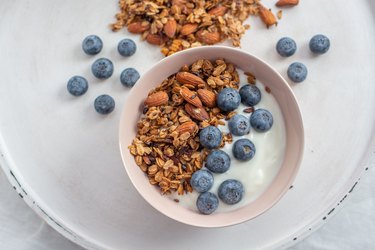
Just as the plant-based milk category has exploded, so has a burgeoning group of vegan yogurt brands. Nowadays, dairy-free yogurts are made with anything from oats and almonds to soy and flax, offering options for vegans and plant-forward eaters to enjoy the delicious and nutritious yogurt we've grown to love.
What to Look for When Buying Vegan Yogurt
Video of the Day
Just as with traditional dairy yogurt, it's important to look at both the nutrition panel and the ingredients. So what should you look out for specifically? When it comes to the nutrition facts, the four key pieces of information to consider are saturated fat, added sugars, protein and added probiotics.
Video of the Day
Saturated Fat
Most vegan yogurts are void of any significant amounts of saturated fat with the exception of coconut-based options. If you're watching your overall saturated fat intake — especially for people with heart disease or high cholesterol — perhaps consider another variety with limited amounts of saturated fat.
The Cleveland Clinic recommends people with elevated LDL cholesterol levels reduce their saturated fat intake to no more than 7 percent of total calories, while adults with normal LDL levels can consume up to 10 percent of total calories from saturated fat.
Added Sugar
When it comes to added sugars, most of us are unaware of how much we're actually consuming. On average, adults eat 17 teaspoons or 270 calories' worth of added sugars per day. If this sounds like a lot, it is! The American Heart Association recommends limiting intake to about 25 grams per day for women (6 teaspoons or 100 calories' worth) and 36 grams per day for men (9 teaspoons or 150 calories' worth). The good news is that we found some vegan yogurt options with zero added sugars!
Read more: Which Type of Yogurt Is Best?
Protein
Most people think of yogurt (and other dairy products) as a great source of protein. When it comes to plant-based yogurt alternatives, there are a few types and brands with significant protein, but that's usually not the case. Should you be concerned? Not necessarily. The truth is, most of us are already getting our fair share of protein each day, but if it's a macro you're tracking, then it is something to consider.
Probiotics
Lastly, part of what makes yogurt so great for us is its gut-friendly probiotics. If a yogurt brand contains probiotics, it will list "live active cultures" or "live probiotics" on the packaging. Another tip is to check the ingredients where the actual cultures may be listed.

Types of Vegan Yogurt
Below, you'll find the seven most popular types of vegan yogurts, as well as specific brands worth a try.
1. Soy Yogurt
Soy yogurt is usually made up of a base of soy milk plus active cultures. The good news is that the yogurt retains the protein content from the actual soybeans, so you can expect to get about 6 grams per 5.3-ounce serving.
Brand We Love: Silk
2. Coconut Milk Yogurt
Coconut milk yogurt is rich and creamy with a slightly tropical essence that blends well with fruit and chocolate flavors. The saturated fat varies quite a bit based on how much actual coconut is in the product. For example, a 5.3-ounce serving of So Delicious' unsweetened coconut milk yogurt alternative (which starts with filtered water as the first and most abundant ingredient, followed by organic coconut cream) packs in 4.5 grams of saturated fat, while GT's Cocoyo (which starts with raw young coconut as the first ingredient) boasts 8 grams of saturated fat per 4-ounce serving! While coconut milk-based yogurts pack in the fats, note that they often lack protein.
Brands We Love: So Delicious, Chobani, GT's and Daiya
3. Almond Milk Yogurt
Almond-based yogurts now reign as the most popular non-dairy yogurt, likely thanks to continued innovation and expansion in the non-dairy category. Typically, almond-based yogurts come short on protein (much like almond milk), but Kite Hill's Greek Style yogurt packs 11 grams of plant-based protein per serving. Kite Hill offers a variety of flavors including Lemon Meringue, Key Lime, Chocolate Coconut, and Mango as well as different textures (Greek Style included).
Brands We Love: Kite Hill and Good Plants (by Light & Fit)
4. Cashew-Based Yogurt
Yes, cashewgurt is a thing; at least that's what Forager Project, one of the more popular cashew-based yogurt brands, is calling it. Similar to almond milk-based yogurt's manufacturing process, cashews are blended with water and cultured to make a delicious, plant-based yogurt. Also similar to almond varieties, cashew-based yogurt is often lacking in the protein department, typically only offering 2 to 3 grams per serving. However, Vega adds pea protein to the equation, bumping the protein up to 13 grams per serving.
Brands We Love: Forager Project and Vega
5. Pili Nut Yogurt
We're guessing that this type of dairy-free yogurt will be a new one for most people. The pili nut is a type of nut grown in fertile volcanic soil (how cool is that?), and it's loaded with nutrients, healthy fats and antioxidants. Currently, Lavva is the only brand out there tapping into this plant wonder. Lavva combines pili nuts with plantains, coconut, lime, cassava, real fruit (for flavor) and salt for a super clean ingredient list to boot. One thing missing from this list? Added sugars! Try the Mango flavor — you can thank us later.
Brand We Love: Lavva
6. Oat Milk Yogurt
Just as oat milk makes the creamiest vegan lattes, oat milk-based yogurts also do not disappoint. These yogurts are naturally lower in protein but Nancy's adds fava bean protein to help bump up the content. Nancy's also offers a simple ingredients list including water, oat flour, fava bean protein, tapioca flour, coconut oil, agar, citric acid and live and active cultures (for the plain flavor) and is gluten-free. The Strawberry-Hibiscus is our favorite.
Brand We Love: Nancy's
7. Flax Milk Yogurt
Similar to pili nuts and oats, there's currently only one major brand out there slaying the flax milk yogurt category and that's Good Karma. Because they rely on flax seeds as a base, each serving of their yogurts is naturally rich in omega-3s (800 milligrams) and plant protein (5 to 6 grams). Good Karma offers five flavors: Plain, Vanilla, Raspberry, Blueberry and Strawberry. Flax milk yogurt is also a great option for anyone with an allergy to tree nuts, soy or oats.
Brand We Love: Good Karma
Read more: List of Dairy-Free Foods
- Cleveland Clinic: "Fat: What You Need to Know"
- American Heart Association: "Added Sugars"
- Health.gov: "Cut Down on Added Sugars"
- PR Newswire: "Almond Yogurt Remains Bestseller, as Vegan Yogurt Transitions From Niche to Mainstream, Finds Fact.MR"
- PR Newswire: Almond Yogurt Remains Bestseller, as Vegan Yogurt Transitions From Niche to Mainstream, Finds Fact.MR
- So Delicious: Unsweetened Plain Coconutmilk Yogurt Alternative
- Chobani: Non-dairy Yogurts
- Daiya Foods: Yogurt Alternatives
- Anita's Coconut Yogurt
- GT's: Cocoyo Yogurt
- Circulation: Dietary sugars intake and cardiovascular health: a scientific statement from the American Heart Association.
- American Heart Association: Protein and Heart Health
- Stonyfield: Non-dairy Yogurts